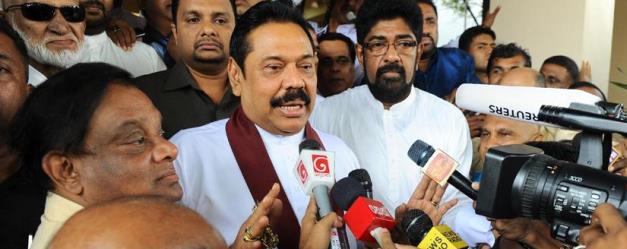[Sri Lankan President Mahinda Rajapakse speaks to journalists in Colombo on December 8, 2014;AFP photo]
By Amal Jayasinghe (AFP)
Sri Lanka’s president, under pressure from his main opponent in upcoming elections, on Tuesday promised a judicial inquiry into allegations that his troops killed thousands of Tamil civilians at the end of the civil war
Sri Lankan President Mahinda Rajapakse (C) speaks to journalists in Colombo on December 8, 2014 after handing in his nomination papers for the January polls
But President Mahinda Rajapakse reiterated that he would not cooperate with a UN-mandated investigation into the government’s 2009 crushing of the Tamil Tiger rebellion.
“If any rights have been violated (during the war), justice will be ensured through a transparent domestic judicial mechanism,” Rajapakse said in his election manifesto.
It did not say how this would differ from an inquiry he ordered in July, following intense foreign pressure to account for the 2009 killing of Tamil civilians.
A 2011 United Nations report cited estimates from “credible sources” that up to 40,000 civilians may have been killed in the final months of the war.
Rajapakse is credited with crushing the Tamil Tiger rebels who at the height of their power between 1990 and 1995 controlled a third of Sri Lanka’s territory.
But he is also accused of rights abuses and is perceived by some as an increasingly authoritarian ruler.
Maithripala Sirisena, his main opponent in the January 8 presidential election, has already promised a similar investigation.
Rajapakse was seen as the favourite when he called the snap election in November, two years ahead of schedule.
But Sirisena has emerged as a formidable opponent after securing the support of all the main opposition groups, including the tacit support of minority Tamils.
– ‘Need apologies and forgiving’ –
The New York-based political risk analysis firm Eurasia Group said the opposition’s Sirisena
was likely to “narrowly win,” but that a desperate Rajapakse could still use security forces to
discourage opposition supporters from voting.
“Fresh defections from President Rajapakse’s ruling coalition suggest that opposition candidate Maithripala Sirisena will narrowly win the presidency when votes are counted on 8 January,” Eurasia’s Sasha Riser-Kositsky said in a report released Monday night.
He was referring to Industry and Commerce Minister Rishad Bathiudeen who quit the coalition government on Monday and withdrew the support of his All Ceylon Makkal (People’s) Congress.
The Brussels-based International Crisis Group warned two weeks ago that Rajapakse could try to remain in power by using security forces, a suggestion discounted by both the military and the opposition.
Opposition leader Ranil Wickremesinghe told business leaders in Colombo Tuesday that a majority in the armed forces were sympathetic to the opposition and he expected a peaceful transition.
Wickremesinghe said they will hold no grudges, but ensure rule of law which he said had been undermined by Rajapakse who is also accused of suppressing dissent despite the end of the separatist war.
The United Nations has estimated that at least 100,000 people were killed in Sri Lanka’s separatist war between 1972 and 2009, when security forces declared victory over the rebels who fought for independence for minority Tamils.
Tamils account for about 15 percent of the population and usually vote together. They will be kingmakers if, as seems likely, the majority Sinhalese community is split down the middle between Rajapakse and Sirisena.
Wickremesinghe said they would ensure a South African-style truth commission if Sirisena was elected in January.
“We need some sort of a truth-seeking mechanism where there will be apologies and forgiving,” Wickremesinghe said.
Rajapakse had also toyed with the idea of a truth commission, whereby perpetrators confess to their crimes but are not prosecuted.
However, he did not pursue it. Instead, in July he asked a Commission of Inquiry already investigating the disappearance of nearly 20,000 people during the war to include other alleged abuses in its investigation
AFP
